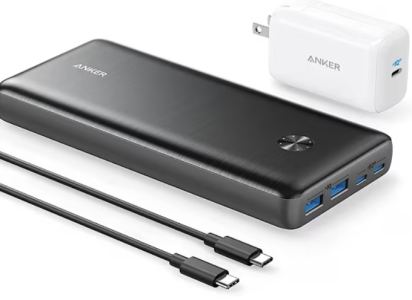Anker recalls over 1 million portable chargers after fire hazard reports—here’s what to do if you own one
By
Veronica E.
- Replies 0
Most of us keep a power bank close at hand these days—whether it’s tucked in a purse for errands, in the car for emergencies, or packed for trips to visit family.
But one popular charger may be putting users at serious risk.
Anker Innovations has issued a major recall for more than 1 million of its portable chargers due to overheating and fire concerns.
If you’ve bought one in recent years, it’s worth checking now.
Some of these devices have reportedly caused fires, melted surfaces, and even led to injuries.
Here’s what to know—and how to stay safe.

The problem: overheating and fire risk
The US Consumer Product Safety Commission (CPSC) announced the recall of Anker’s PowerCore 10000 power banks, specifically those with model number A1263.
These units contain lithium-ion batteries that can overheat during use, potentially causing smoke, melting, or fire.
So far, 19 incidents have been reported, including two cases of minor burns and more than a dozen instances of property damage—adding up to over $60,000 in losses.
While that’s a small percentage of the 1.15 million sold, the risks are serious enough to warrant immediate action.
Also read: Are you using one of these popular chargers? Find out if your power bank is a hidden fire risk!
Is your charger affected?
If you purchased an Anker PowerCore 10000 between June 2016 and December 2022, you could be affected—especially if you bought it through Anker’s website, Amazon, eBay, or Newegg.
Here’s how to check:
How to get your free replacement
Anker is offering a free replacement for affected customers.
To claim yours:
Once submitted, a replacement charger will be sent at no cost.
Also read: Is your money trapped? Find out why Wells Fargo has started freezing bank accounts.
Don’t toss it in the trash
It’s important not to throw the recalled charger in your regular garbage or recycling.
Lithium-ion batteries can pose a serious fire hazard when disposed of improperly. Instead:

Also read: Elder fraud case: Personal assistant accused of stealing $10M—see the shocking thing she brought to court
Why lithium-ion batteries can be risky
Lithium-ion batteries are widely used in smartphones, tablets, power tools, and more—but they’re also prone to overheating if damaged or poorly manufactured.
The National Fire Protection Association (NFPA) advises stopping use immediately if you notice:
If you notice any of these, unplug the device and place it somewhere nonflammable—such as outdoors—until you can dispose of it properly.
Safety tips for using electronics at home
This recall is a good reminder to be cautious with everyday devices. A few simple habits can help prevent dangerous situations:
Staying on top of product recalls like this one helps keep your home and loved ones safe.
If you think your charger might be affected, don’t wait—check it today and take the necessary steps to get a free replacement.
Read next: Are you destroying your phone battery without realizing it? Here’s what experts say about charging to 100%

Have you experienced a close call with a charger or device? Are you affected by the Anker recall? Share your experiences and advice in the comments—your insight might help someone else stay safe. We’re always here to help you stay informed, protected, and connected!
But one popular charger may be putting users at serious risk.
Anker Innovations has issued a major recall for more than 1 million of its portable chargers due to overheating and fire concerns.
If you’ve bought one in recent years, it’s worth checking now.
Some of these devices have reportedly caused fires, melted surfaces, and even led to injuries.
Here’s what to know—and how to stay safe.

Over 1 million portable chargers have been recalled due to safety concerns involving overheating and fire risk. Image Source: YouTube / Guy Reviews.
The problem: overheating and fire risk
The US Consumer Product Safety Commission (CPSC) announced the recall of Anker’s PowerCore 10000 power banks, specifically those with model number A1263.
These units contain lithium-ion batteries that can overheat during use, potentially causing smoke, melting, or fire.
So far, 19 incidents have been reported, including two cases of minor burns and more than a dozen instances of property damage—adding up to over $60,000 in losses.
While that’s a small percentage of the 1.15 million sold, the risks are serious enough to warrant immediate action.
Also read: Are you using one of these popular chargers? Find out if your power bank is a hidden fire risk!
Is your charger affected?
If you purchased an Anker PowerCore 10000 between June 2016 and December 2022, you could be affected—especially if you bought it through Anker’s website, Amazon, eBay, or Newegg.
Here’s how to check:
- Look for model A1263 on the device (usually printed on the back or bottom).
- Find the serial number, which you’ll need to confirm eligibility on Anker’s recall site.
- Stop using the charger right away if it matches the recall. Even if it seems to work, continued use could be dangerous.
How to get your free replacement
Anker is offering a free replacement for affected customers.
To claim yours:
- Write your name, the date, and the word "recalled" on the device (or use a sticky note).
- Take a photo showing the model and serial number.
- Submit the photo and details on Anker’s recall website.
Once submitted, a replacement charger will be sent at no cost.
Also read: Is your money trapped? Find out why Wells Fargo has started freezing bank accounts.
Don’t toss it in the trash
It’s important not to throw the recalled charger in your regular garbage or recycling.
Lithium-ion batteries can pose a serious fire hazard when disposed of improperly. Instead:
- Check your local waste management website for safe battery disposal options.
- Many communities offer drop-off sites or hazardous waste collection events.

The recalled PowerCore 10000 model from Anker has been linked to reports of overheating and fire hazards. Image Source: YouTube / KVUE.
Also read: Elder fraud case: Personal assistant accused of stealing $10M—see the shocking thing she brought to court
Why lithium-ion batteries can be risky
Lithium-ion batteries are widely used in smartphones, tablets, power tools, and more—but they’re also prone to overheating if damaged or poorly manufactured.
The National Fire Protection Association (NFPA) advises stopping use immediately if you notice:
- Strange odors
- Swelling or discoloration
- Heat while idle
- Leaking fluids
- Hissing or popping sounds
If you notice any of these, unplug the device and place it somewhere nonflammable—such as outdoors—until you can dispose of it properly.
Safety tips for using electronics at home
This recall is a good reminder to be cautious with everyday devices. A few simple habits can help prevent dangerous situations:
- Buy from trusted brands and sellers. Cheaper knockoffs may skip safety checks.
- Don’t leave devices charging unattended, especially overnight.
- Avoid charging on soft surfaces like couches or bedding where heat can build up.
- Replace old chargers that show signs of damage or wear.
Staying on top of product recalls like this one helps keep your home and loved ones safe.
If you think your charger might be affected, don’t wait—check it today and take the necessary steps to get a free replacement.
Read next: Are you destroying your phone battery without realizing it? Here’s what experts say about charging to 100%
Key Takeaways
- Anker is recalling over 1.1 million PowerCore 10000 portable chargers after reports of overheating, fires, and explosions—including 19 incidents and two minor burn injuries.
- Affected units have the model number A1263 and were sold between June 2016 and December 2022 through Anker’s website, Amazon, eBay, and Newegg.
- Consumers should immediately stop using the device, check the model and serial number, and request a free replacement from Anker.
- Lithium-ion batteries must be disposed of properly to avoid fire hazards—never throw them in regular trash or household recycling bins.
Have you experienced a close call with a charger or device? Are you affected by the Anker recall? Share your experiences and advice in the comments—your insight might help someone else stay safe. We’re always here to help you stay informed, protected, and connected!






